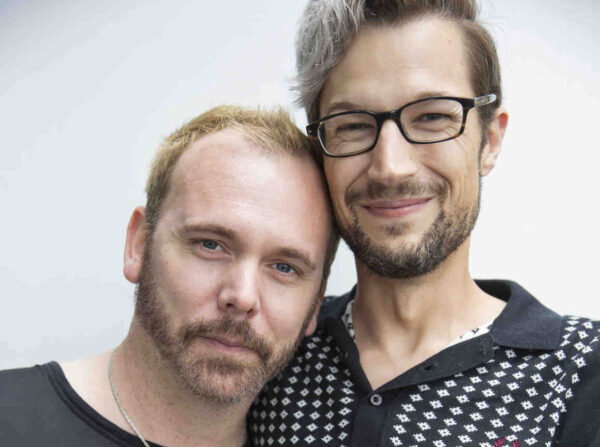What was this case about?
This case involves a business that is open to the public refusing to sell a wedding cake to a couple because they are LGBTQ. In 2012, Dave Mullins and Charlie Craig, together with Charlie’s mother Deborah Munn, visited Masterpiece Cakeshop, a Denver‐area bakery, to purchase a cake for their wedding reception. Without any discussion of the design of the cake, the bakery’s owner told the couple he wouldn’t sell them a wedding cake because they are a same-sex couple.
Colorado, like many other states, prohibits all businesses open to the public, including Masterpiece Cakeshop, from refusing service to people based on their religion, race, sex, sexual orientation or gender identity, among other characteristics. This law ensures that people are free to go about their day‐to‐day lives without worrying they will be turned away from stores, banks, hotels and other public places simply because of who they are.
Masterpiece Cakeshop admitted that it had a policy of refusing service to same-sex couples seeking wedding cakes and argued that it had a constitutional right to discriminate in violation of Colorado law, based on religious and free speech grounds.
The Colorado Civil Rights Commission decided that Masterpiece Cakeshop violated Colorado's antidiscrimination law when it turned away Dave and Charlie.
What did the Supreme Court say?
The Supreme Court reversed the Colorado Civil Rights Commission's decision. The court had concerns that the Commission showed bias when considering the bakery’s religion‐based defense. While it is disappointing that the Court let the bakery’s discrimination here go unchecked, it did so only because of concerns unique to this case.
Most importantly, the Court did not give businesses the broad right to discriminate that the bakery and the Trump administration wanted. Our nation decided more than 50 years ago that when a business decides to open its doors to the public, that business should be open to all. The Supreme Court protected that core principle, expressly recognizing that states can seek to prevent the harms of discrimination, including against LGBTQ people.
What does the decision mean for existing laws against discrimination that protect LGBTQ people?
Cities and states can still enforce their laws against discrimination, including laws that protect LGBTQ people from discrimination at stores and business. The Court did not give businesses a right to discriminate, either based on speech or religion. Instead, the Supreme Court recognized that laws against discrimination are important ways to protect the dignity of all of us.
Did the Supreme Court treat LGBTQ discrimination differently than other forms of prohibited discrimination, such as sex discrimination or race discrimination?
No. While the Court did not resolve the ultimate issue of whether the Constitution gives businesses a license to discriminate, it said that states and cities can, and at times must, ensure equal treatment of LGBTQ people. It discussed our longstanding tradition of barring discrimination by businesses open to the public, including laws that protect people from discrimination based on race, disability, sex, religion and other characteristics. Importantly, the Court said that “it is a general rule that such objections do not allow business owners and other actors in the economy and in society to deny protected persons equal access to goods and services under a neutral and generally applicable public accommodations law.”
Are there other cases like this? What happens next in those cases?
While most businesses open to the public serve all customers equally, several businesses across the country have asked courts for exemptions similar to the one that bakery asked for in this case. We expect those businesses will keep arguing that the Constitution gives them the right to discriminate in commercial transactions.
But the Supreme Court recognized in Masterpiece that courts must not subject LGBTQ people to indignity when they seek goods and services from businesses open to the public. And in fact, an appeals court in Arizona agreed just days after the decision, in a case involving a calligraphy studio that sought the right to refuse service to same-sex couples. The appeals court ruled that “if [the business] want[s] to operate their for-profit business as a public accommodation, they cannot discriminate against potential patrons based on sexual orientation.” The court emphasized that “[p]rohibiting places of public accommodation from discriminating against customers is not just about ensuring equal access, but about eradicating the construction of a second-class citizenship and diminishing humiliation and social stigma.”
What if I experience discrimination because I’m LGBTQ?
No one should be fired from their job, denied a place to live, or turned away from a business simply because of who they are. Contact us if you experience discrimination, we may be able to help.
Unfortunately, discrimination against LGBTQ people is still pervasive and widespread —in stores and restaurants, in the workplace, in housing, in healthcare, and in education. Yet we still don’t have comprehensive, nationwide protections. That’s why businesses, religious leaders, civil rights advocates, health organizations, labor groups, LGBTQ people and our friends, families, and allies are joining together to call on Congress to pass the Equality Act and create one set of rules for everyone. It’s time for our nation’s laws to catch up to our nation’s values and protect all of us from discrimination.
